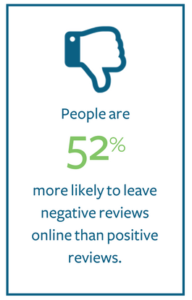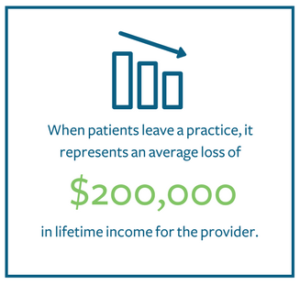It’s True, Customer Service Is Critical in Healthcare
“It is so much easier to be nice, to be respectful, to put yourself in your customers’ shoes and try to understand how you might help them before they ask for help, than it is to try to mend a broken customer relationship.”
Mark Cuban, Entrepreneur, Shark Tank regular, and Owner of the Dallas Mavericks

Even before the preeminence of the internet, it would have been difficult to find a successful business person who would disagree with that sentiment. With the ubiquity of online reviews and the amount of trust that people place in posts on Google, Yelp, WebMD and many other sites, customer service is more important than ever.
As Jeff Bezos, founder of Amazon.com, poignantly stated, “If you make customers unhappy in the physical world, they might each tell six friends. If you make customers unhappy on the internet, they can each tell 6,000.” Unfortunately for business owners, people are 52% more likely to leave negative reviews online than positive reviews.
Despite these observable trends in everyday life, very few hospitals or health systems prioritize customer service as restaurants, retailers or hotels do.

But statistically, patients are just as likely to switch healthcare providers as hotels, cell phone providers or banks due to poor customer service. As each patient represents $200,000 in lifetime income for the typical practice, undervaluing customer service is an extremely costly mistake.
The good news is that great customer service carries an equally impactful upside for providers. Starting with a pre-service estimate, all the way until final bill resolution, patients behave as consumers, and great customer service in the billing process dramatically increases rates of full patient payments.
When satisfied with the billing experience, 74% of patients fulfill their financial obligations. Compared to the average rate of nonpayment–two in three patients that do not pay their bills in full–customer service in the revenue cycle presents a tremendous financial opportunity.
How should providers approach customer service in their billing process? There are three major qualities to consider and build upon.
- Accessibility: From financial information to payment tools and billing staff, easy access shows the patient that you understand their situation and have taken all the necessary steps to anticipate their needs.
- Transparency: In terms of past and current financial obligations, patients will feel much more comfortable paying bills that they can easily understand.
- Personal Preferences: Giving patients the choice of when and how–phone, text, email or live chat–they can seek assistance proves that you respect their time and understand the way they like to communicate. Allowing patients to create their own payment plans online shows that your organization seeks to empower them as a consumer.
Customer service is an ongoing challenge in healthcare for good reason. The provider only has so much control over the clinical and insurance-related aspects that impact the patient’s perception. But providers can own the financial process and ensure that it is guided by excellent customer service. At Sirono, we’ve created an innovative platform to make that possible for any hospital or health system. Reach out today for help in building a customer service experience that drives revenue.
[1] “Bad Customer Service Interactions More Likely to Be Shared Than Good Ones”, http://www.marketingcharts.com/online/bad-customer-service-interactions-more-likely-to-be-shared-than-goodones-28628
[2] http://pacificmedicalcenters.org/images/uploads/KCMS_Customer_Service_in_Healthcare.pdf
[4] Prakash, Patient Satisfaction, https://www.ncbi.nlm.nih.gov/pmc/articles/PMC3047732/#ref6, (Journal of Cutaneous and Aesthetic Surgery, 2010), 151-155.
[5] Kelly Gooch, Study: Satisfied patients more likely to pay medical bills in full, https://www.beckershospitalreview.com/finance/study-satisfied-patients-more-likely-to-pay-medical-bills-in-full.html, (Becker’s Hospital Review, 2016).
[6] “Patients May be the New Payers, But Two in Three Do Not Pay Their Hospital Bills in Full”, https://newsroom.transunion.com/patients-may-be-the-new-payers-but-two-in-three-do-not-pay-their-hospital-bills-in-full, (TransUnion, 2017).





